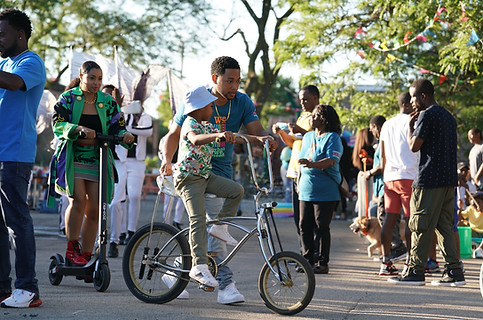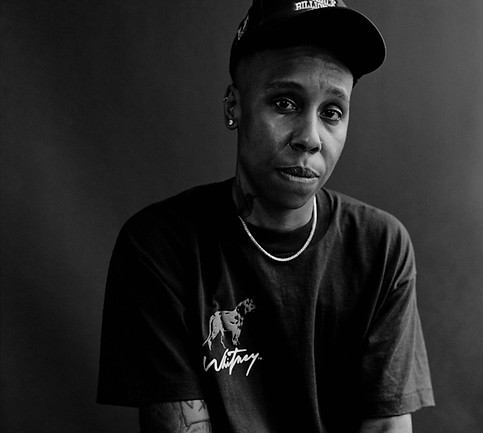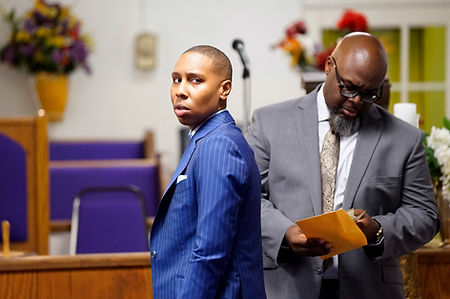
The Chi proved to be a standout since its 2018 launch on Showtime. Written and executive produced by Waithe and executive produced by another Chicago native, Common, the show highlights an insider’s perspective of the city, often using local actors and filming entirely on location. “We shoot all over the city, it depends on the story, but we go to real places,” she explained. From a corner store in West Lawndale to a West Loop restaurant, The Chi is filled with authentic Chicago nuances.
The story follows a revolving group of interconnected characters. In season one, Kevin, Jake and Papa are adolescents growing up on the South Side, dealing with school, crushes and street life, while Emmett navigates being a teen father and his single mother, Jada, pushes him to be responsible while providing him with emotional support. Kiesha is Kevin’s older sister, an outspoken track star who earns a college scholarship. Brandon and Jerrika are a young, upwardly mobile couple. Brandon works as a sous chef in a West Loop restaurant and law school grad Jerrika works as a real estate agent, but they plan on opening a restaurant together. Over five seasons, the characters’ lives change as they grow and interact with the city in different ways.
“I know Chicago in a lot of different ways,” she says of the show’s range of situations and performances. “Chicago doesn’t have just one perspective or experience, it’s very layered. We try to show how community shows up in different ways and how families form in different ways. My experience in the city is vast because I’ve seen so many different sides of it.”
Waithe grew up near 79th Street in the Chatham community in the heart of Chicago’s South Side, the same neighborhood Chance The Rapper is from. Her mother and grandmother raised her in the same house her mother grew up in, with lots of elders around in the neighborhood. There was a constant familial vibe to her upbringing, growing up with the children of the people her mom grew up with. She attended a magnet school where her teachers recognized her gift for writing. Constantly watching ’90s TV shows like The Cosby Show and A Different World as well as Spike Lee movies, Waithe knew she wanted to be a TV writer by the time she was seven.
At 12, she moved to the northern suburb of Evanston, where she was exposed to different cultures for the first time. Evanston is known for its diversity and Waithe soaked up the different lifestyles, economic backgrounds and traditions that would later inform her writing. She attended Columbia College Chicago, located downtown, along the famous Michigan Avenue. There, she gained the perspective of living in the glossy environs of the city, with skyscrapers and Lake Michigan as the backdrop.“I love Chicago like a family member, it’s a part of me,” she said of her relationship to the city. The love comes through in the details of the show. Scenes like Jake going downtown to the Shedd Aquarium and falling in awe of seeing the lake for the first time or shots of the “L” rumbling along the Green Line’s Garfield stop, or Emmett working at Sonny’s Chicken Pit, an obvious reference to the Chicago institution, Harold’s Chicken Shack.
Even Emmett’s name is a Chicago detail. “I named him for Emmett Till,” Waithe said, referring to the Chicago youth who was lynched in Mississippi in 1955 and whose brutal murder galvanized the civil rights movement. “There’s a lot in a name and I’m particular about names for characters. Most of us know that story from childhood. It’s a part of who we are. I named him to honor that life. Those who know, know. I push that history in my work."


LENA
WAITHE
By Rosalind Cummings-Yeates
If there has ever been an artist who represents Chicago in all its layers and dimensions, it’s Lena Waithe. As an actor, writer, producer, and founder, Waithe has created a head-spinning amount of award-winning TV shows, movies, initiatives, and companies. Indeed, she personifies the Chicago nickname, “the city that works.” But it’s not just her drive, it’s her creativity and storytelling skills that manage to showcase the humanity reflected in all of us. The Midwestern warmth, the sass, and the humor of Chicagoans flow through all her characters, no matter the setting. “I try to have a dialogue with the audience,” Waithe explained about her multi-faceted work.
Her portfolio includes producing and writing the TV series Boomerang and Twenties, and producing the upcoming, Being Mary: The Mary Tyler Moore Documentary. As a writer, she has written for TV shows like Bones, Girls Room and the series that introduced her as an actor, Master of None. She’s written two feature films, Beauty and Queen & Slim, and produced the recent A Thousand and One. Waithe also created Hillman Grad, a media production company that turns out film and TV projects, music, books and podcasts as well as hosting a successful mentorship program. Of course, besides becoming the first Black woman to win an Emmy for outstanding writing in a comedy series in 2017 for Master of None, Waithe is best known as the creator, writer and producer of coming-of-age drama, The Chi, set and filmed in Chicago.

SHOWTIME

Credit: Elizabeth Sisson/ SHOWTIME
“We have a lot of Chicago-specific things, but we’ve realized that other cities, Detroit, Atlanta, L.A., love the show too,” she said. “It made us realize that Chicago has become universal. It’s about Chicago but a lot of the stories reflect us as a society in general.”
Although the storylines sometimes draw from situations in the city, Waithe pulls from a lot of different inspirations for the show. “It really is a group effort. Justin [Hillian, co-showrunner/EP], Jewel [Coronel, co-showrunner/EP], Ricardo [Gamboa, producer] come up with stories. We look at, where are we? How have we grown? What are the actors going through? The show is different with each season because we evolve each season. We have to entertain but there really is no formula. We refuse to be put in a box. I’ve found people will start in season five or season three. You can watch each season as a whole without seeing the previous one. And each season our numbers go up,” she said.
The series has continually transformed since the first season, which focused more on violence and police activities as they relate to the characters’ lives. By season two, the spotlight was on the relationships between friends, brothers, parents and lovers. The maturation of the characters, with a new marriage, new businesses and new relationships, is the highlight of season three, with Waithe making an appearance as a mayoral candidate. “Season four is all about healing and season five is all about love,” said Waithe. “Season five was like As The Chi Turns [soap opera] and season six will be like New Jack Chi City, with more violence.”
Through all the changes, Waithe feels like she has developed along with the series. “It’s been an interesting journey. I’ve grown up and my career has grown with the show. I really got a chance to grow as an artist,” she said. For her, Chicago and artistry go hand in hand. “It’s an artful city. There’s art all around and this is a city where a lot of legendary artists lived: Lorraine [Hansberry, first Black playwright to have a play performed on Broadway, A Raisin In The Sun], Donnie [Hathaway, iconic soul singer and musician], Quincy [Jones, celebrated composer and record producer with 28 Grammys], Chaka [Khan, ground-breaking R&B singer with a five-decade career].” Waithe herself was named after the famed singer, actor and civil rights activist, Lena Horne.
Besides the art, Waithe’s favorite thing about Chicago is the people. “Whenever I go into places [on the South Side], I always experience what I call Southern hospitality. It’s because so many of our grandparents came from the South. I went into a takeout restaurant and the woman in line in front of me was talking to the clerk. She didn’t see me at first but when she did, she turned around and apologized for taking so long,” she said, chuckling. “You might get frustrated with it, but I love this city.”
Credit: Andre Wagner
